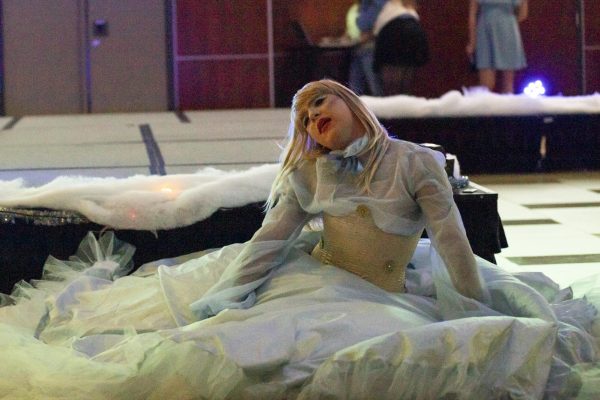Community garden brings all walks of life together
Darryl Carrington, a Community Garden Advocate, talks about the process of growing and maintaining sweet potatoes.
Parsley, mint leaves, potatoes, and strawberries adorn the grounds of the community garden on Fairmount and 16th St.
Darryl Carrington, student and community garden advocate, said the garden is another step in connecting the Fairmount and Shocker communities.
“The reason for the community garden is for people of different denominations to come together,” Carrington said. The garden is a place to promote diversity and participation. Many members of the community come to this place to take and give back.”
The garden was set up by the Fairmount United Church of Christ on a plot of land purchased across from the church to house the neighborhood playground.
Mythili Menon, assistant professor of English and linguistics, teaches the class “Language of Food,” and students volunteer at the garden for their service-learning project.
“The idea behind this is for students to apply what they have learned in class outside of the classroom,” Menon said.
While volunteering in the community garden, Menon said students are exposed to different kinds of people they don’t usually meet. She also said the garden encourages students to learn more about their community and how food is taken for granted in today’s society.
In addition, the garden has been a place of connection for TRIO, a college opportunity program aimed at supporting and motivating young students from disadvantaged backgrounds. This year, middle school and high school students are learning about the abilities potatoes have to combat diabetes through the garden.
Alongside Shockers and the TRIO program in the garden are members of the Fairmount community. Carrington describes the garden’s visitors as “eagles” and “turkeys.” He said the eagles donate and participates in the garden while the turkeys take and feed off the land.
“This can be a community that doesn’t have enough,” Menon said. “Students can learn from this real-world experience, which is a community that relies on this garden for their meals.”
Carrington said many people are attracted to the garden, not only to garden but to form relationships with people from different walks of life.
He said gardening is a great way to not only give back to the community but also help those that are in need.
“I have seen people that don’t naturally come together,” Carrington said. “In this garden, I have spoken to people of different denominations and race.”
Fiona Kee was a reporter for The Sunflower. Kee was born in Tampa, Florida, but was raised in Rawang, Malaysia.



















